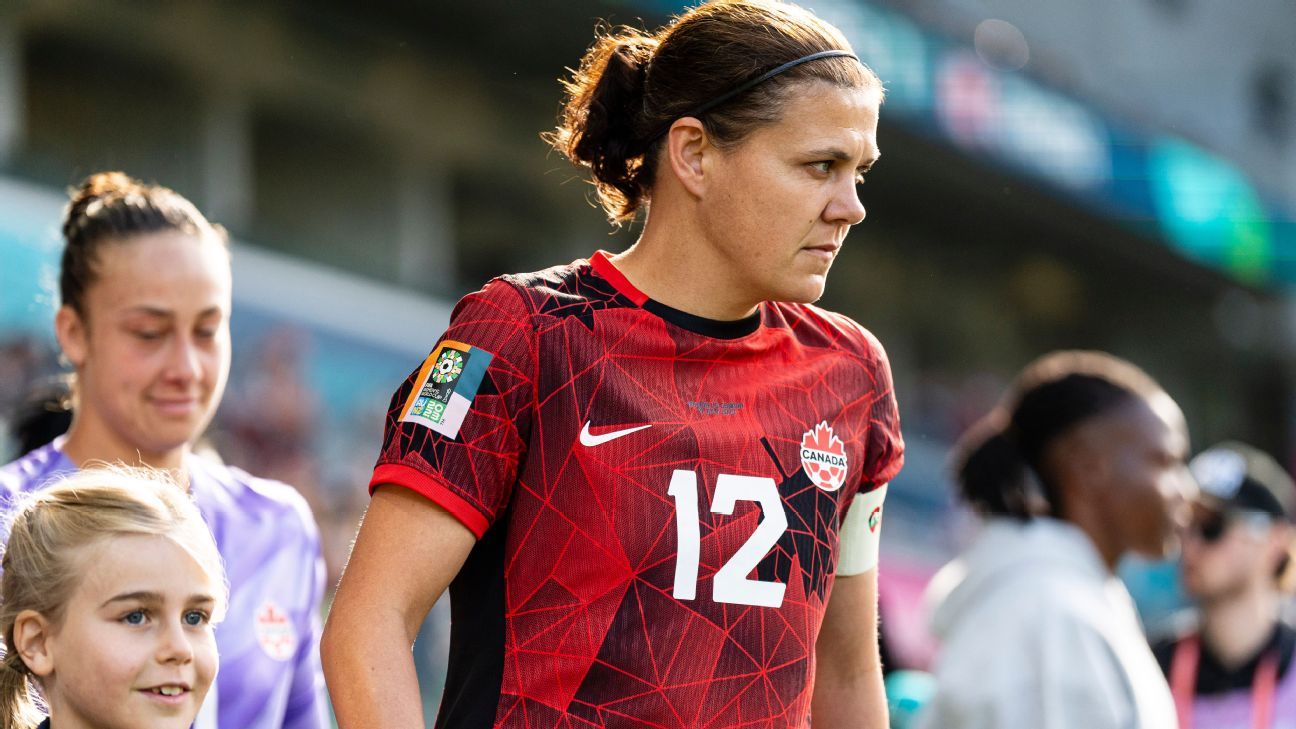AUCKLAND, New Zealand — Heading into Wednesday’s second Women’s World Cup group stage game as Canada take on the Republic of Ireland, Christine Sinclair stands on the edge of history: a goal would make her the first man or woman to score at six World Cups.
It’s no secret that this will be her last World Cup, either; Sinclair (or “Sinc”) has been there and done it all before, both in the NWSL and with Canada on the international stage. She knows what it’s like to spar time with the U.S.; she also knows what it’s like to reach a World Cup and go out after just three group stage matches. She has felt success and heartbreak in her professional life, like two summers ago when Canada defied the odds to win Olympic gold after a shoot-out against Sweden.
– Women’s World Cup: Schedule | Rosters | News
– How teams can quality for the round of 16
Even though Sinc the person (quiet, avoidant of the spotlight) has always kept a clear distance from Sinc the player (bombastic, impactful, dynamic), it’s hard to talk about her consistency on the pitch without mentioning how much she hates the spotlight. Indeed, as the record goalscorer anywhere in international football — her 190 goals eclipses Cristiano Ronaldo’s 123 in the men’s game, for example — Sinclair is the antithesis of the megastars and mega-egos you’d expect with such on-field performance. What drives her isn’t fame or money, but team success; it’s clear Canadian women’s football wouldn’t be where it is today without over two decades of service from the British Columbia native.
Having made her senior debut as a 16-year-old in 2000, Sinclair would bounce between youth and senior levels for Canada, setting collegiate records while she wasn’t representing her country. Her consistent performances yielded a raft of individual accolades, but unlike others with the same hunger for goal, Sinclair remained just outside of the public consciousness, her natural modesty playing its part. But she continued on in the same vein, transferring youth form to collegiate level to the senior team and rarely looking out of place.
2:16
Canada devastated after legend Christine Sinclair’s penalty miss
Reaction from both sides as Canada were denied a win at the Women’s World Cup by a penalty save from Nigeria’s Chiamaka Nnadozie.
Rising to the rank of captain in 2006 for Canada’s run at the Gold Cup, Sinclair remained steadfast in her performances: she was a natural leader in that team and a natural choice for captain. Although still just in her early 20s, Sinclair led from the front; dubbed “the face of soccer in Canada” by the New York Times after Canada’s historic bronze medal at the 2012 Olympics, Sinclair was at her vintage best that summer, inspiring the Canucks as they battled through the tournament. Her six-goal haul (leading all scorers) helped Canada to a fully deserved bronze medal.
With her national team dipping in and out of form, Sinclair claimed Canada’s only goal of the group stage at their home World Cup in 2015, but the hosts ultimately fell flat, losing to England in the quarterfinals. A team renewed at the Rio Olympics the following summer, Canada again claimed bronze with Sinclair (three goals) playing the starring role once more.
Sinclair’s fifth World Cup, in 2019, saw her become just the second player in history to score at five World Cups (after Brazil‘s Marta) when she netted against the Dutch en route to a round of 16 exit against Sweden. Slowing down as she aged, the discussions about Sinclair setting the all-time goalscoring record – then held by Abby Wambach – dragged on for years as the Canadian neared the record, but struggled to break it.
Sinclair eventually did tie and break Wambach’s record, aged 36, but her focus was still on the team. She helped Canada claim gold at the Tokyo Olympics in 2021 despite just scoring once and it would be a watershed moment for Canadian women’s soccer, with Sinclair — and a handful of other veterans — using the victory to speak out about the lack of professional women’s league in Canada and pushing for change. Despite usually wanting to shy away, the growing conflict with Canada Soccer saw Sinclair use her platform and voice, taking the lead on negotiations with her federation, again her motivations for the betterment of Canadian soccer.
– Stream on ESPN+: LaLiga, Bundesliga, more (U.S.)
Sinclair could yet make more history as the first person to score at six consecutive World Cups, having spurned a golden chance from the penalty spot against Nigeria in Canada’s first game. On the surface, her legacy will undoubtedly revolve around those goals, but as she continues to push for better in Canada and ask more of her federation, Sinclair’s legacy is about what she’s done for women’s soccer in Canada and what she’s done for her teammates (both domestic and international). Her legacy will be that of a quiet but deadly forward, an intelligent player who can read the pitch like she can her teammates, a studious and hardworking footballer, and a player whose dedication has helped her remain a force on the pitch for over two decades.
Maybe never fully given her dues, as she approaches the end of her playing career, there is still chance for more history and even, a golden goodbye for Canada’s beloved daughter.
